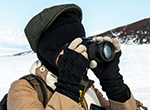|
Features - Artists and Writers Program Most Recent
Quick Find
More ResultsApr
28
2016
The Aesthetics of Antarctic ArchitectureFeatures | Artists and Writers Program The current aesthetics of McMurdo station and its field camps are not likely to go down in history as great achievements of modern architecture. But for photographer Shaun O'Boyle, this weathered, utilitarian look was a part of what attracted him to Antarctica. Jun
29
2015
All Creatures Great and SmallFeatures | Artists and Writers Program The story of how Los Angeles-based artist Lily Simonson ended up scuba diving under the sea ice in Antarctica begins with a tale about lobsters, moths and yeti crabs. Oct
30
2014
Through the Looking GlassFeatures | Artists and Writers Program There's a saying that necessity is the mother of invention. April Surgent discovered that being trapped by ice at a research station in Antarctica for the better part of two months required a little flexibility and ingenuity when it came to fulfilling her artistic vision. Feb
14
2014
Little OblivionFeatures | Artists and Writers Program After graduating with a Masters of Fine Arts degree, Susan J. Allspaw Pomeroy did what any other poet and academic would do: She jumped on a research boat to Antarctica to work as a tech writer. More than a dozen years later, Pomeroy published her debut book of poetry about her first love: Antarctica. Dec
27
2013
Poetic LicenseFeatures | Artists and Writers Program When poet Jynne Martin learned the National Science Foundation sponsored an Antarctic Artists and Writers Program, she immediately applied for a chance to visit the place of her childhood dreams. She followed seals and scientists in the pursuit to learn about the research for her next book of poetry. Aug
08
2013
Not FlatFeatures | Artists and Writers Program Katharine Coles isn't your stereotypical poet. She founded the Utah Symposium in Science and Literature, and she comes from a family of scientists. So it certainly wasn't a stretch that her interest in science would take her to Antarctica on a grant from the National Science Foundation. May
02
2013
Final CountdownFeatures | Artists and Writers Program Anthony Powell has been working on his documentary about the world's coldest continent for about a decade now. Finally, Antarctica: A Year on Ice will start hitting movie theaters this summer. Apr
12
2013
Airy WordsFeatures | Artists and Writers Program Charles Hood's latest work, South x South, celebrates Antarctica's aviation history and unique culture through a series of poems, from the playful to the meditative. His work was supported by a grant from the NSF's Artists and Writers Program. Mar
15
2013
Developing New PerspectivesFeatures | Artists and Writers Program Larissa Min's family is originally from Korea. She was born in Brazil. At age 12, her family migrated from South America to the United States. The creative writer naturally tackles themes of identity and displacement. Her next continental shift will take place in Antarctica. Jan
27
2012
Embedded with scientistsFeatures | Artists and Writers Program Chris Linder has taken part in two dozen research expeditions over the last decade, many of them to the polar regions. It seemed only a matter of time before he produced a book on his experiences from four of those expeditions, including one to Antarctica and a visit with the continent's iconic bird, the Adélie penguin. Aug
26
2011
Birth of Antarctic ScienceFeatures | Artists and Writers Program Historian Edward Larson believes an important thread is missing from the vast tapestry of lore that has been spun about the Heroic Age of Antarctic Exploration. Many of the men who toiled, suffered and even died in the early 20th century did so first and foremost in the pursuit of science. Aug
19
2011
The Art of ScienceFeatures | Artists and Writers Program Poet Katharine Coles went to Palmer Station on an Antarctic Artists and Writers grant from the National Science Foundation. What compelled her to go? She answers as only a poet can: Truth, of course. Cheek-to-cheek contact with the sublime. Insight into the nature of reality. Feb
11
2011
Science Takes OffFeatures | Artists and Writers Program Charles Hood's book will explore the relationship between aviation and science in Antarctica. He wonders: Is there really a strong relationship between flying and doing research? The answer from the scientists themselves: It's simple. No airplanes means no science.
|
||||||||||||||||||||||||||||||



For USAP Participants |
For The Public |
For Researchers and EducatorsContact UsU.S. National Science FoundationOffice of Polar Programs Geosciences Directorate 2415 Eisenhower Avenue, Suite W7100 Alexandria, VA 22314 Sign up for the NSF Office of Polar Programs newsletter and events. Feedback Form |



